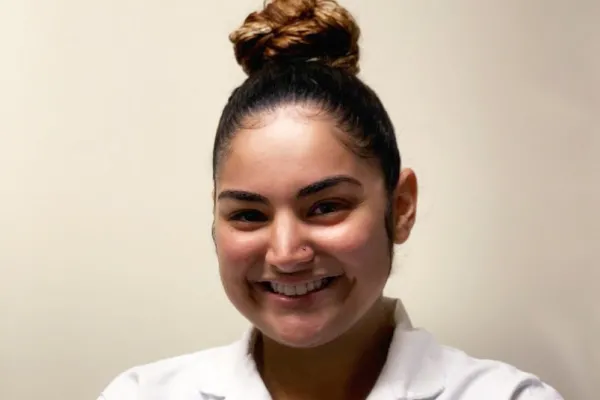Ahlenne Abreu ’22: Goldwater Scholar
Research & Inquiry
Published May 17, 2021
Ahlenne Abreu ’22 had never taken a chemistry class when she first started at Smith in 2018. Originally from Washington Heights, Manhattan, she attended a high school that was under-resourced and unable to offer more complex STEM classes.
Now, though, the junior biochemistry major is one of just 409 students in the U.S. to receive a prestigious Barry Goldwater scholarship, which will cover up to $7,500 per year toward college expenses.
“This scholarship means everything to me,” Abreu beams. “It’s going to open so many doors.”
Abreu’s path to the esteemed scholarship was anything but linear. She filled gaps in her high school career with programs she found within her community, such as an opportunity through Cold Spring Harbor Laboratory to study DNA barcoding. Abreu is also among Smith’s New York Posse Foundation STEM cohort, which provides ongoing support for STEM-oriented students as they embark on their college careers.
While these programs helped tremendously, Abreu still felt behind when she began taking STEM classes at Smith. “I was going to tutoring literally every single night,” she says. “It was so daunting.”
Still, she persevered, and quickly found herself excelling. In 2019, Abreu conducted an immunoblotting study with professor of biological sciences Stylianos Scordilis as part of a SURF fellowship.
In summer 2020, a research position through Cold Spring Harbor Laboratory was deferred until 2021 due to the pandemic. Upon learning of the delay, Abreu quickly pivoted and landed another opportunity—one that could be completed remotely—reviewing primary literature and contributing to a paper on myogenesis with Professor Scordilis.
One of Abreu’s primary research interests is Alzheimer’s disease, which has touched her life personally. “My grandma had Alzheimer’s, and it was so stressful for my family,” she says, adding that her grandmother lived in Ecuador while the rest of her family was in the U.S. trying to arrange her medical care.
A recent interterm class, “Race and Gender in Science: Neurological Diseases,” opened Abreu’s eyes to the statistical disparities between the populations who are most likely to be diagnosed with Alzheimer’s disease and those who are most able to receive proper care and support.
The fact that the disease is more likely to affect those who are Black and Hispanic is very personal to her. “I’m Latina—this disease is targeting my people,” she says. “I feel like I need to do something about it.”
Abreu’s ultimate goals are to obtain a doctorate in molecular pharmacology, which would help her study and develop possible treatments for diseases like Alzheimer’s.
Wherever her future takes her, she’s very interested in giving back. Abreu hopes to be able to mentor students—either at the high school or postdoc level—while working full-time in a pharmaceutical lab. “And if that doesn’t come about naturally,” she says with a laugh, “then I’ll just have to start my own mentoring program!”
Photograph by Francesco Del Re ’21
